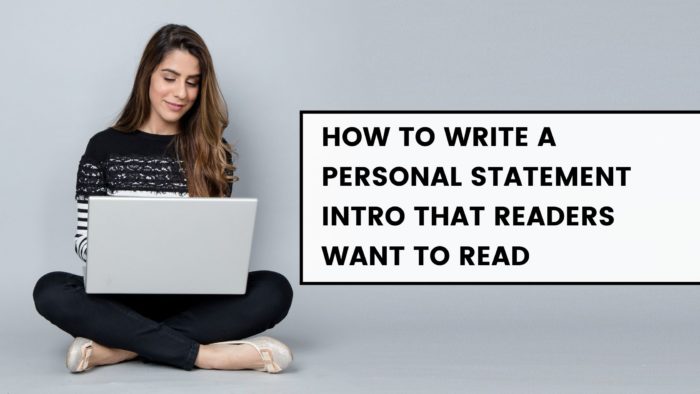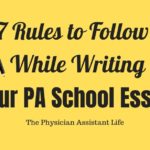
You’ve probably heard the advice that you should open your personal statement with a story or anecdote.
This story should “grab” your readers’ interest, tell them who you are, and help pivot to the main theme: what brings you to the PA profession.
That’s a lot to ask of one anecdote, and choosing the right one can feel intimidating.
Here are some tips for choosing––and telling––your best story
The “three things” rule
The conventional wisdom among people who study this genre (yes, there are people who study statements of purpose) is that readers can remember three identifying details about you.
Your opening story is where you can use that knowledge to make sure that your readers remember the details you want them to.
Don’t start with a story of your childhood unless it leads directly to your interest in being a PA.
Think of your personal statement as helping your readers paint a mental picture of you. PA school requires hard work, dedication, and maturity. You want the admissions committee readers to envision you as someone who is mature and well-prepared to succeed in PA school. While it is possible to get there from an anecdote about your childhood, it’s going to take additional steps. Even if you have known you wanted to be a PA since you were putting Band-Aids on your stuffed animals in kindergarten, that’s probably not the only–or most relevant–story that you have.
Also, this is such a common introductory topic that it’s practically a default setting.
What to write instead.
Think about an experience you’ve had as an adult that inspired you and made you think “I want to be a PA so that I can do [X].” Focus on that “doing” part–we want readers to see you in action.
Here are some ideas to consider. Jot down an answer for each of these that is relevant.
- Shadowing PAs, observing, or working alongside a PA
- Caring for a patient
- A moment of teamwork
- A time when you felt fulfilled
- A time when you felt frustrated
Once you have a couple of ideas to choose from, you can see which one is going to lead you to your main point: Why you want to be a PA.
Don’t start with a story about a different healthcare professional.
Maybe a different medical professional inspired your interest in healthcare, a doctor, RN, or EMT, and from there you discovered the PA profession. The better choice is the story that begins with a PA––an encounter as a patient, shadowing, collaboration, etc.
What to write instead.
Starting with your specific PA experience means you don’t have as many steps between the opening and why you want to be a PA. You have more room to develop the story, and your reader isn’t left to wonder where you’re going with it. You don’t want readers to think that you really wanted to have a different career but have settled on PA for whatever reason.
The prompt asks applicants to explain why they want to be PAs and not just healthcare providers in a general sense.
Don’t write about your personal health problems.
Another topic to avoid in your PA school essay is referring to your own health problems–again, with the exception of an anecdote that is directly relevant to PAs.
When we return to that idea of the three things that readers remember about you, you want to be very careful with one of them being the image of you ill or infirm. Even though illnesses, injuries, and loss often shape who we are and make us stronger and more resilient, you can’t predict how AdComms will see this information.
What to write instead.
If your big AHA-moment that brought you to this point was when you broke your leg and a PA was the one who cared for you with great compassion and expertise, that’s fine. But, tell us about that awesome PA. What did that PA do, specifically, that inspired you? You have a very limited amount of real estate on the page; use more of it to talk about the PA. You can acknowledge your illness or injury with a broad generalization; Something like this: “When I was in the hospital with an illness/injury/recurring health problem….” Then the focus is less on you and more on the PA profession.
Don’t write too much about yourself.
Enough about you! Let’s talk about ME! Another pothole to avoid is the tendency to tell your story with too much YOU in it.
I know, you’re thinking “wait, isn’t this essay supposed to be about me?” It is, but stay with me here. It’s easy to start writing about your experiences and suddenly find yourself with an essay full of the word “I,” and reading those kinds of essays can get old fast.
What to write instead.
Let’s face it. You’re going to have to write I, me, and my. Just think of them as a necessary ingredient, like salt, for example, that you don’t want to overuse.
It’s fine to start every sentence with I on your first draft while you’re trying to work out your topics, but when you start editing and revising your personal essay, see if you can flip the perspective on some of those I/me/my statements. Instead of “I felt inspired by the PA’s caring words,” try “The PA’s caring words inspired me.”
Don’t write about how the PA profession is going to benefit you.
You may have heard a lot of great things about having a career as a PA: the training prepares you to move between PA specialties so you’re less likely to get burned out or bored; the training is shorter and costs less than getting an MD; there’s more “work-life balance.” (That work-life balance might start to sound like this applicant wants to leave early to make it to crazy pants night at the karaoke bar every Thursday.) While these all may be true to some extent, they are all about why the career would benefit YOU.
Write this instead.
There is nothing wrong with an interesting job, saving time and money, or work-life balance. All of those are good things, but, again, consider how they might sound to the committee readers who've already read a big pile of these essays when they get to yours.
- What do you have to contribute as a PA?
- How can you use your training to be a giver, rather than a taker, in your community?
When you apply to any graduate school, you are asking them to invest in you: time, money, and effort. What are you going to do with that investment? How are you going to represent their institution and the PA profession in the world? How are you going to make the world a better place, if only on a limited scale? Be a good return on investment.
Don’t go for the “dark and stormy night” opener.
I know, you’ve been told more or less forever that you’ve got to write an "eye-catching” opening that will “grab” your reader’s attention. And you’re wringing your hands trying to think of a dramatic moment from your life, or at least one that can be embellished to seem more intense or cinematic. “And as the lightning bolts crashed down around me at the top of the volcano, I knew that it was my calling to be a PA!” You can imagine that those would start to seem a bit overwrought after a while to our poor AdComm reader.
What to write instead.
Most PA school applicants were not creative writing majors, but here’s the good news: neither were most committee readers. No one expects you to write the Great American Novel or the opening scene from an action movie. You are a scientist; your readers are scientists. They will understand the impact of experiences that might seem less-than-dramatic to healthcare-provider people. In fact, they probably have first-hand experience with how powerful some of the smallest gestures can be–listening to a patient, making someone feel welcome and valued, sharing a personal story. Go with simple and authentic over pyrotechnics.
It’s all about empathy.
In the courses I teach on writing and rhetoric–and you might remember this from your college composition courses–we talk about what makes writing effective (affiliate link). It’s not so much a question of writing being good or bad as it is of it working. It has to be appropriate to its audience, purpose, and occasion.
Think about that. Really put yourself in your committee reader’s position. What is that reader doing? What is that reader’s task? How can you make that reader’s task easier?
Envision that reader, your audience: She’s probably not getting paid to read these applications. Being on academic committees is considered a required “service” to the institution.
What is the occasion on which she is reading? Maybe she’s been at work all day, she’s tired, and her kids are thundering through the house like maniacs as she reads the personal statements that have been assigned to her.
Really envision her. This is what I tell my students. Is she still wearing her scrubs? Does she have a cat sleeping in her lap?
What is she looking for? What is her purpose for reading? She wants to get to know you a little bit better, wants to envision you as a real person and not just a resume, transcript, or profile. She does not want to have to work hard to figure out what you’re saying or why you’re using the word “utilize” when “use” works just fine. She remembers being in your shoes and feels a connection to some of your shared experiences. She wants to know that you have a pretty good idea of what you’re getting into and that you’re ready for it.
She also understands that a statement of purpose is a unique genre, or category, of writing. She is not expecting Harry Potter, Shakespearean sonnets, a legal document, or advertising copy. She does not want a challenging narrative technique or plot twist. Writing to meet her expectations helps her to engage with, comprehend, and retain the content.
Great news! PAs are GREAT at empathy!
Seriously, it is practically their superpower. Empathizing with your reader is an opportunity for you to hone that craft.
It can be hard to shake off the writing advice we got in high school, probably because we were quite literally drilled on it–with a stopwatch–and told, implicitly or explicitly, that if we didn’t do it this way, we wouldn’t get into college and it was a short path from there to a tragic life.
If you want to really attract your reader’s attention, keep it, and help them remember you, go for clarity and authenticity. We here at The PA Life can help you hit just the right note and help you feel more confident about meeting the challenge of the compelling opening scene.
A Lesson from the Professor: Grammatical Bulk
Something to keep in mind as you write your introduction–and your whole personal statement, for that matter–is what we professors of rhetoric and composition (writing) call “grammatical bulk.” Here’s what that means.
The reading brain does all kinds of guessing and forecasting to make reading and comprehension faster and easier. For example, it assumes that items that are physically close together on a page (“proximity”) are more closely related in meaning than those that are physically farther from each other.
Another assumption that readers’ brains make is that whatever takes up more physical space on a page is the most important. Readers “hear” this topic in their heads as more emphatic, simply because, relative to the rest of the text, there’s more of it. We can use this knowledge to make sure that we give more space to the topics we want our readers to emphasize and less to the topics on which we’d prefer that they read, note, and move along.
So, as you look at your introductory narrative, imagine dividing it into its main themes and highlighting each with a different color. The one that has the most “grammatical bulk”--just the biggest blob of color–will be the one that your reader unconsciously assumes is most important.
Conclusion: Intros and conclusions as sandwich bread
If you’re still not sure which of your stories to use as your introduction, consider how it will work with your conclusion.
While we don’t want to revert to the high school trick of concluding by saying something like “In conclusion…” and then repeating your intro and high points, it is useful to think of the introductory paragraph and the concluding paragraph as bookends or two slices of bread holding the sandwich together.
In this metaphor, your body paragraphs are the lettuce, tomatoes, lunchmeat, and condiments. What topics do you want to address in your conclusion? Do you need to tie up any loose ends? Look toward the future? An intro and conclusion that have a clear relationship can make an essay feel whole and contained.
The Takeaway
The introduction to your personal statement is like the first domino in a domino rally. If you take the time to set it up thoughtfully, it will make the rest of the essay fall gracefully. We here at The PA Life know that it’s not easy, but if you’re applying to PA school, you’re probably good at doing hard things. We’re cheering for you!
Single Edit One-on-one Service Supplemental Essays
View all posts in this series
- How to Write the Perfect Physician Assistant School Application Essay
- The Physician Assistant Essay and Personal Statement Collaborative
- Do You Recognize These 7 Common Mistakes in Your Personal Statement?
- 7 Essays in 7 Days: PA Personal Statement Workshop: Essay 1, “A PA Changed My Life”
- PA Personal Statement Workshop: Essay 2, “I Want to Move Towards the Forefront of Patient Care”
- PA Personal Statement Workshop: Essay 3, “She Smiled, Said “Gracias!” and Gave me a Big Hug”
- PA Personal Statement Workshop: Essay 4, “I Have Gained so Much Experience by Working With Patients”
- PA Personal Statement Workshop: Essay 5, “Then Reach, my Son, and Lift Your People up With You”
- PA Personal Statement Workshop: Essay 6, “That First Day in Surgery was the First Day of the Rest of my Life”
- PA Personal Statement Workshop: Essay 7, “I Want to Take People From Dying to Living, I Want to Get Them Down From the Cliff.”
- Physician Assistant Personal Statement Workshop: “To say I was an accident-prone child is an understatement”
- 9 Simple Steps to Avoid Silly Spelling and Grammar Goofs in Your PA School Personel Statement
- 5 Tips to Get you Started on Your Personal Essay (and why you should do it now)
- How to Write Your Physician Assistant Personal Statement The Book!
- How to Write “Physician Assistant” The Definitive PA Grammar Guide
- 101 PA School Admissions Essays: The Book!
- 5 Things I’ve Learned Going Into My Fourth Physician Assistant Application Cycle
- 7 Tips for Addressing Shortcomings in Your PA School Personal Statement
- The #1 Mistake PRE-PAs Make on Their Personal Statement
- The Ultimate PA School Personal Statement Starter Kit
- The Ultimate Guide to CASPA Character and Space Limits
- 10 Questions Every PA School Personal Statement Must Answer
- 5 PA School Essays That Got These Pre-PAs Accepted Into PA School
- 7 Questions to Ask Yourself While Writing Your PA School Personal Statement
- 101 PA School Applicants Answer: What’s Your Greatest Strength?
- 12 Secrets to Writing an Irresistible PA School Personal Statement
- 7 Rules You Must Follow While Writing Your PA School Essay
- You Have 625 Words and 2.5 Minutes to Get Into PA School: Use Them Wisely
- What’s Your #1 Personal Statement Struggle?
- 31 (NEW) CASPA PA School Personal Statement Examples
- How to Prepare for Your PA School Interview Day Essay
- Should You Write Physician Associate or Physician Assistant on Your PA School Essay?
- Meet the World’s Sexiest PA School Applicants
- PA School Reapplicants: How to Rewrite Your PA School Essay for Guaranteed Success
- How to Write a Personal Statement Intro that Readers Want to Read
- PA School Reapplicant Personal Statement Checklist
- How to Deal with Bad News in Your Personal Statement
- Inside Out: How to use Pixar’s Rules of Storytelling to Improve your PA Personal Statement
- Ratatouille: A Pixar Recipe for PA School Personal Statement Success
- Personal Statement Panel Review (Replay)
- Mind Mapping: A Tool for Personal Statements, Supplemental Essays, and Interviews
- Start at the End: Advice for your PA School Personal Statement
















Leave a Reply